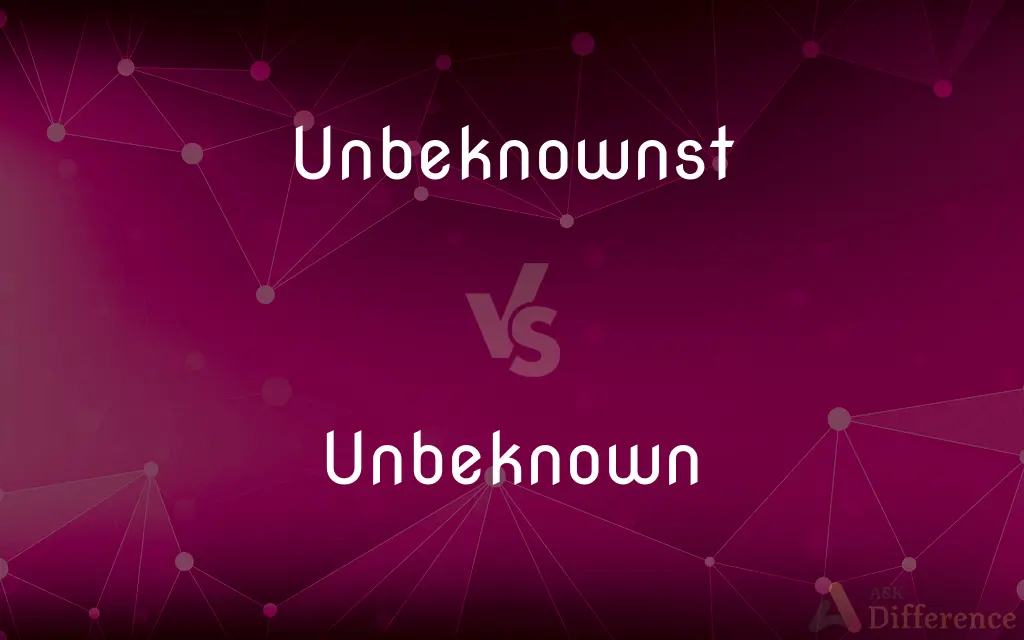Unbeknownst vs. Unbeknown — What's the Difference?
By Maham Liaqat & Fiza Rafique — Updated on February 22, 2024
"Unbeknownst" and "unbeknown" both indicate a state of not being known or unaware, but "unbeknownst" is more commonly used, especially in modern American English.

Difference Between Unbeknownst and Unbeknown
Table of Contents
ADVERTISEMENT
Key Differences
"Unbeknownst" and "unbeknown" are adjectives that describe something not known or not realized by someone. The primary difference between the two lies in their usage and frequency in contemporary language. "Unbeknownst" is the variant more commonly found in modern English, particularly in American English, and is often followed by "to" to indicate to whom something is unknown. For example, "Unbeknownst to her, the plans had changed." It suggests that the information or situation was not known to a particular person or group at a specific time.
"Unbeknown," on the other hand, is an older form and less commonly used in current language, though it is still understood and recognized as correct. It serves the same function as "unbeknownst," indicating that something is not within someone's knowledge or awareness. For instance, "Unbeknown to him, he was about to enter a trap." This form might be seen in more formal or literary contexts, reflecting a stylistic preference rather than a difference in meaning.
The choice between "unbeknownst" and "unbeknown" largely depends on the writer's or speaker's preference, regional language norms, and the context in which it is used. Despite their slight variations in form, the meaning conveyed by both words is the same, and they can be used interchangeably without altering the essence of the message.
In terms of usage, it's important to consider the audience and the setting. "Unbeknownst" is more universally recognized and therefore might be a safer choice in general communication, while "unbeknown" could be employed for stylistic reasons or in specific contexts where its older connotation is desired.
Comparison Chart
Usage
More common in modern English
Less common, more archaic
ADVERTISEMENT
Prevalence
Preferred in American English
Found in British English and older texts
Construction
Often used with "to" (e.g., unbeknownst to her)
Used similarly, but considered more formal or literary
Context
General and informal contexts
Formal or literary contexts
Regional Preference
Favored in the United States
No strong regional preference, but less frequently used
Compare with Definitions
Unbeknownst
Without someone's knowledge.
Unbeknownst to the teacher, the students planned a surprise.
Unbeknown
Not within the knowledge of.
Unbeknown to her, the document was forged.
Unbeknownst
Occurring without the awareness of involved parties.
Unbeknownst to us, our conversation was overheard.
Unbeknown
Happening without the awareness of someone.
Unbeknown to the crew, the course had been changed.
Unbeknownst
Not known or aware.
Unbeknownst to them, the meeting had been canceled.
Unbeknown
Unknown or unrecognized fact.
Unbeknown to many, the artist lived a double life.
Unbeknownst
Reflecting a lack of awareness.
Unbeknownst to him, his efforts were in vain.
Unbeknown
Reflecting unawareness or secrecy.
Unbeknown to them, their fate was sealed.
Unbeknownst
Secretly or hidden from knowledge.
Unbeknownst to the public, negotiations were underway.
Unbeknown
Secret or undisclosed information.
Unbeknown to the world, the treaty had been signed.
Unbeknownst
Without the knowledge of a specified party. Used with to.
Our cousin had been ill for years, unbeknownst to the family.
Unbeknown
Occurring or existing without being known; unknown.
A crisis unbeknown to us.
Unbeknown
Without someone's knowledge.
Unbeknownst to me, she made all the arrangements.
Unbeknown
Not beknown.
Common Curiosities
Can "unbeknownst" and "unbeknown" be used interchangeably?
Yes, they can be used interchangeably without altering the meaning of a sentence.
Is there a difference in meaning between "unbeknownst" and "unbeknown"?
No, there is no significant difference in meaning; the difference lies in usage and frequency.
Why might someone choose "unbeknown" over "unbeknownst"?
Choosing "unbeknown" might be a stylistic preference or a nod to a more formal or literary context.
Are there any grammatical concerns with using "unbeknownst" or "unbeknown"?
Both are adjectives and should be used correctly within the context of a sentence, typically followed by "to" to indicate to whom something is unknown.
Which is more commonly used, "unbeknownst" or "unbeknown"?
"Unbeknownst" is more commonly used, especially in modern American English.
How do you use "unbeknownst" in a sentence?
"Unbeknownst to her, the secret plan was already in motion."
What is the origin of "unbeknownst"?
Both "unbeknownst" and "unbeknown" derive from the combination of "un-" (not) with "beknown" (known), reflecting a construction from older forms of English.
Is "unbeknownst" considered informal?
Not necessarily informal, but "unbeknownst" is more widely accepted in general communication than "unbeknown."
What does "unbeknownst" mean?
Unbeknownst means not known or realized by someone, often indicating that something happens without a person's awareness.
Is "unbeknown" outdated?
While less common today, "unbeknown" is not necessarily outdated and can still be found in various texts, especially those with a more formal or literary tone.
Do "unbeknownst" and "unbeknown" have synonyms?
Yes, synonyms include "unknown," "unaware," and "without one's knowledge."
How can I decide which word to use?
Consider your audience, the context of your writing or speech, and personal preference for modern versus more traditional language.
Can "unbeknownst" be used in formal writing?
Yes, "unbeknownst" can be used in formal writing, but it's important to consider the tone and style of the piece to ensure it fits appropriately.
Has the use of "unbeknownst" and "unbeknown" changed over time?
Yes, "unbeknownst" has become more prevalent, particularly in American English, while "unbeknown" sees less frequent use.
Can these words be used in any context?
While versatile, it's best to use "unbeknownst" and "unbeknown" in contexts where their meaning of being unknown or unaware is clearly applicable and adds value to the narrative.
Share Your Discovery

Previous Comparison
Transpiration vs. Guttation
Next Comparison
Condole vs. ConsoleAuthor Spotlight
Written by
Maham LiaqatCo-written by
Fiza RafiqueFiza Rafique is a skilled content writer at AskDifference.com, where she meticulously refines and enhances written pieces. Drawing from her vast editorial expertise, Fiza ensures clarity, accuracy, and precision in every article. Passionate about language, she continually seeks to elevate the quality of content for readers worldwide.












































